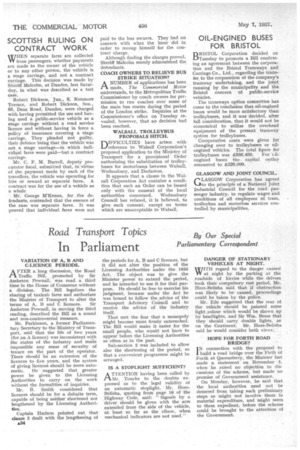SCOTTISH RULING ON CONTRACT WORK
Page 52

If you've noticed an error in this article please click here to report it so we can fix it.
WHEN separate fares are collected VI' from passengers, whether payments are made to the owner of the vehicle or to any other person, the vehicle is a .stage carriage, and not a contract carriage. This decision was made by Sheriff Malcolm, at Dundee, last Saturday, in what was described as a test Case.
" Robert Dickson, Jun., 8, Kenmore Terrace, and Robert Dickson, Sen., 85, Dens Road, Dundee, were charged with having permitted the use and having used a public-service vehicle as a stage carriage without a road service licence and without having in force a policy of insurance covering a stage carriage. They pleaded not guilty, their defence being that the vehicle was not a stage carriage—in which individual fares were paid—but a contract carriage.
Mr. C. F. M. Burrell, deputy procurator fiscal, submitted that, in virtue of the payment made by each of the travellers, the vehicle was operating for hire or reward at separate fares. A contract was for the use of a vehicle as a whole Mr. George M'Kenna, for the defendants, contended that the essence of the case was separate fares. It was proved that individual fares were not paid to the bus owners. They had no concern with what the hirer did in order to recoup himself for the contract charge.
Although finding the charges proved, Sheriff Malcolm merely admonished the defendants.
COACH OWNERS TO RELIEVE BUS STRIKE SITUATION?
ANUMBER of applications has been made, The Commercial Motor understands, to the Metropolitan Traffic Commissioner by coach owners for permission to run coaches over some of the main bus routes during the period of the London strike. Inquiries at the Commissioner's office on Tuesday revealed, however, that no decision had been reached.
WALSALL TROLLEYBUS PROPOSALS HITCH.
D'ICULTIES have arisen with reference to Walsall Corporation's proposed application to the Ministry of Transport for a provisional Order authorizing the substitution of trolleybuses for motorbuses between Walsall, Wednesbury, and Darlaston.
It appears that a clause in the Walsall Corporation Act contains a condition that such an Order can be issued only with the consent of the local authorities concerned. Wednesbury Council has refused, it is believed, to give such consent, except on terms which are unacceptable to Walsall.
OIL-ENGINED BUSES FOR BRISTOL
BRISTOL Corporation decided on /Tuesday to promote a Bill confirming an agreement between the corporation and the Bristol Tramways and Carriage Co., Ltd., regarding the transfer to the corporation of the company's tramway undertaking, and the joint running by the municipality and the Bristol concern of public-service vehicles.
The tramways option committee has come to the conclusion that oil-engined buses would be more satisfactory than trolleybuses, and it was decided, after full consideration, that it would not be economical to utilize the overhead equipment of the present tramway system for trolleybuses.
Comparative costs were given for changing over to trolleybuses or oilengined vehicles. The total figure for
trolleybuses was £586,450. For' cilengined buses the. capital outlay amounted to £320,000.
GLASGOW AND JOINT COUNCIL.
GLASGOW Corporation has agreed kalto the principle of a National Joint Industrial Council for the road passenger industry, to regulate wages and conditions of all employees of train, trolleybus and motorbus services controlled by municipalities.




















































































